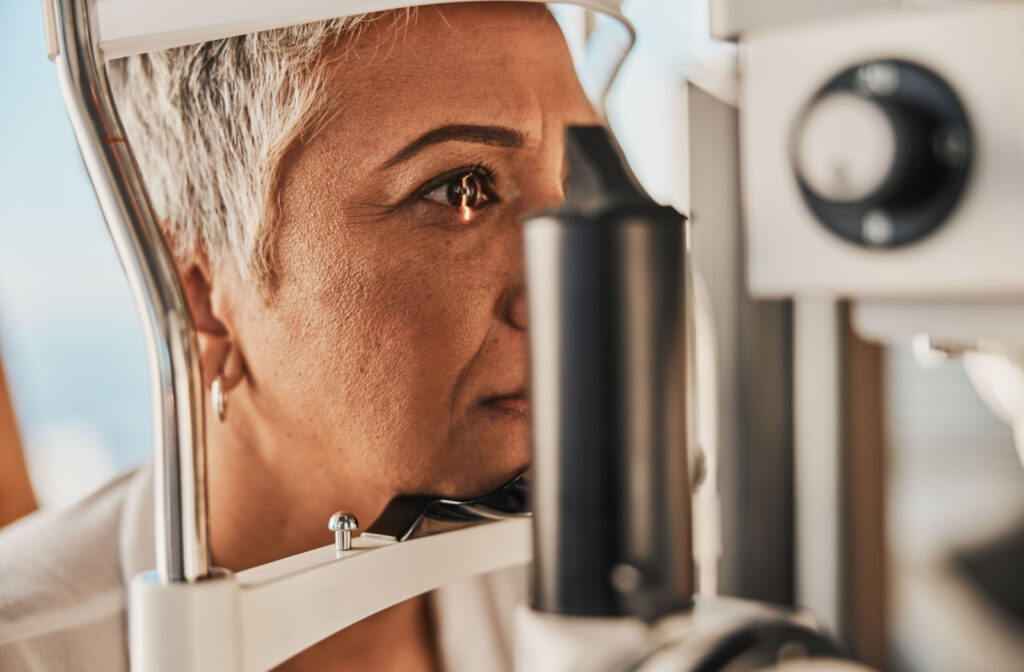Why Am I Seeing Shadows in My Vision?
If you have noticed the presence of shadows or black dots in your vision, it could be a sign of floaters.
This common eye condition is typically benign and associated with aging. While it may be bothersome, floaters usually occur within the eye and eventually dissipate independently.
However, if you are under 50 or experiencing anxiety due to floaters, it is important to visit your eye doctor for a thorough eye examination to detect other potential issues and determine the underlying cause.
What Causes Floaters?
Floaters are a common visual disturbance that many people experience, particularly as they age. The primary cause of floaters is age-related changes in the vitreous, a gel-like substance that fills the eye.
As we get older, the vitreous becomes less gel-like and more liquified, accumulating cells and particles that can clump together and cause visual disturbances.
It’s worth noting that floaters are typically a natural part of aging, and many people experience them by age 70.
In most cases, floaters dissipate naturally or become less noticeable over time. However, sometimes there are more serious eye issues behind seeing shadows in your vision. There are other conditions that can cause changes in the vitreous that lead to the formation of floaters or seeing shadows.
What Are The Symptoms of Floaters?
Floaters do not usually cause pain or discomfort, but their presence can disrupt your vision. Symptoms include:
- Small shapes in your vision
- Spots that move as your eyes shift
- Spots that are most noticeable when looking at plain, blank backgrounds
- Strings that settle and drift away
If you experience these symptoms at the same time as seeing floaters, then you should seek immediate emergency care. Symptoms of a potential emergency include:
- Eye pain
- Floaters occurring more frequently
- Losing peripheral vision
- Unusual blurry vision
- Vision loss
- Light flashes
How Do You Get Rid of Floaters?
While floaters are generally harmless and do not require intervention, treating underlying problems can help alleviate them.
Laser Treatment
Laser removal (also known as vitreolysis) can be an option in severe cases of eye floaters. This procedure entails using a laser to fragment the floaters, which enables them to be extracted from the eye more easily.
While this approach can effectively treat severe cases of eye floaters, discussing the potential risks and benefits with a qualified eye doctor before pursuing the procedure is crucial.
Surgery
Eye floaters can be an annoying and sometimes even debilitating visual disturbance. If you’re dealing with this issue, you may be interested in learning more about surgical options that can help alleviate your symptoms.
One such option is a vitrectomy, which involves removing the vitreous gel from your eye and replacing it with a clear solution. This can help reduce the number of floaters you see and improve your overall visual clarity. Of course, as with any medical procedure, there are risks and potential complications to consider,
Not only do both options have risks, there is no guarantee that the floaters will be broken up or removed. Optometrists generally agree that leaving floaters alone is the best course of action, as they can become less noticeable over time, and you can adapt to them.
What if There Is an Underlying Condition?
There are several underlying issues that could be causing eye floaters, including:
- Retinal tear
- Retinal detachment
- Inflammation in the eye
- Bleeding in the vitreous
- Age-related changes in the eye
- Uveitis (Inner eye inflammation)
- Diabetic retinopathy
- Eye injury
- Eye trauma
- Cataract surgery complications
An eye care specialist may be able to determine the root cause and, from there, work towards helping you manage the situation.
For instance, if there is a symptom of diabetic retinopathy, getting the person’s blood sugar under control can help alleviate symptoms. Or if there is uveitis, your optometrist may prescribe eye drops with steroids.
Overall, treatments can vary depending on the underlying cause, if there is one.

Addressing Floaters & Vision Shadows
If you are experiencing floaters or shadows in your vision, it is important to visit an optometrist for a comprehensive eye exam to determine the health of your eyes.
While most floaters are harmless and do not require intervention, discussing symptoms with your optometrist can help provide peace of mind and help keep your eyes healthy.
Contact us at Pack & Bianes Optometry and book your appointment today. Together we can work towards maintaining and improving your eye health.



